ABISHAN JEEVINTH’S Tourist Family, an all-heart film about Dharmadass (Sasikumar), Vasanthi (Simran) and their two children who illegally enter India by boat from Sri Lanka, and figure out life with hope intact, has struck a chord in the hearts of the audience as well as the box office.
In between hectic promotions and a success meet for his debut film, Abishan, all of 25, revisits a core film memory from when he was in Class 5 or 6. It was possibly at Megastar Cinemas, Tiruchirapalli (Tamil Nadu), the town he grew up in, fell in love with movies (he still usually watches two a day) and met the girl he fell in love with (and proposed marriage to, on stage, just before the film’s release). “I think it starred Prithviraj, and I remember some songs and a dance. Was it Mozhi or a film with the song ‘Banaras Pattu Katti’? I laughed, I cried, and felt my emotions swing,” he says. “But, Ma’am, I can’t remember the name now. I thought I liked it so much because of the characters, but later figured someone behind the scenes was playing a puppeteer and controlling my emotions. I think I respected the words ‘writer’ and ‘director’ that day.” Abishan is three years older than my son, and I quickly reel off some film names that were popular with kids then. And then it strikes Abishan — “Ma’am, I think it is Ninaithaale Inikkum.” You can almost see the smile and relief over the phone line.
Four months ago, the teaser of Tourist Family dropped, showing a Tamil family from Sri Lanka getting ready to migrate to India. It triggered much nostalgia for an era of heart-warming cinema, where kindness and niceness were the norm on screen. When the film released, the audience realised the teaser did not lie — this film did celebrate humaneness, and the need for companionship and empathy.
In a conversation, Abishan walks down memory lane, speaks about his writing and direction process, and why he loves the idea of kindness. Edited excerpts below:
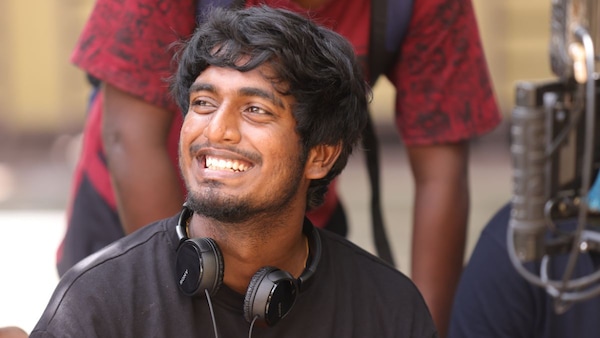
Abishan on the sets of Tourist Family.
Tourist Family has left people feeling warm and loved, and reinforces the need to trust people. Is that also a reflection of how you live your life?
You could say so. I am a very trusting person who values emotions. If someone smiles and speaks, I tend to presume I can trust them and that they are good. I still believe goodness is valued. This probably comes from growing up in a non-metro city. We grew up knowing all our neighbours. There was also a certain innocence about small-town India. We were not exposed to certain things, and life revolved around friends and family. When I moved to Chennai for college (Visual Communication, Loyola), I missed that. Everyone was so busy here.
You began making short films pretty early on, say Class six or so.
Yes, I suddenly started consuming a lot of cinema, and began making shorts early, and sent them to cultural events and short film contests. Off and on, I’d watch Naalaya Iyakkunar. I knew the financial difficulties at home, I kept thinking about our life…All of these ensured I grew up before my age.
Tourist Family is about a Tamil family that migrates illegally from Sri Lanka. Why did you set the film in such a milieu? Were you familiar with it?
It was not an unfamiliar milieu. I had a lot of friends who were Tamils from Sri Lanka, when in Tiruchi. I’ve been to their homes, seen their lives. In cinema, Kamal Haasan-starrer Thenali is a film that charmed me, and I always wanted to do a spiritual continuation of that.
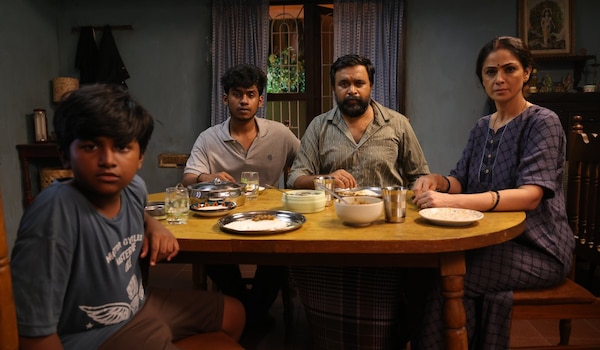
Still from Tourist Family.
Dharmadass’ family goes through so much, but never stops hoping, right?
Everyone has problems, sadness, but not everyone has hope. But hope is what we need, because only that will help us survive and see another day. That was my focus when writing the film. It probably also stems from the fact that, by nature, I also hold on to hope.
One of the admirable things about the film is the succinctness of it all — a glance instead of a dialogue, a hint instead of an explanation… and the film breathes but is not flabby in its runtime (128 minutes).
Yes, I’d agree that brevity is something that I have always had a fondness for. Even during college, I’d do away with unnecessary dialogues. I like films that are crisp. Sometimes, I even skip the backstory. A hint is enough to show they have suffered; how exactly they suffered is something I felt my film did not need. This helped me build the film, layer by layer. First the emotions, then the relentless humour. I wanted the fact that they are illegal refugees to sink in first, before I showed you their hope.
Is that also one reason why nothing from the much-loved teaser found a place in the film?
Yes. It was decided to make an announcement video, and I thought it would be a good chance to introduce the characters, so there would be recall value. I know it is common to cut the teaser to tell a part of the storyline, but I did not want that. I wanted people to see the family first and fall in love with them. That worked.
The star cast that aced their roles is a huge reason why people have accepted the film. Did you visualise these actors playing these characters even when writing the film?
No, not while writing. It was after I did a production pitch. I thought Simran ma’am would lend the film a certain innocence and believability. Her pairing with Sasikumar is very new, and when you see him on screen, you know there’s a solid presence around.
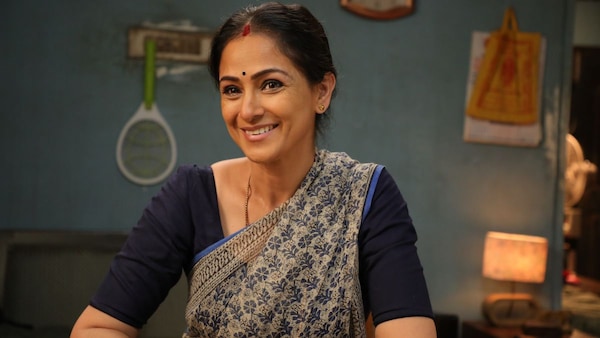
Still from Tourist Family.
You’ve watched the film numerous times, but do you think the audience has made the film theirs, and have so many takes on certain innocuous things?
Oh yes. I have watched it too many times, and did not know what to expect when I saw it in the theatre. Then, I saw it as a new person, through people’s eyes. Their emotions moved me, because they ‘got’ the film, the way I intended to.
In some scenes, they saw added meaning. That scene where Dharmadass caresses a scar on Vasanthi’s wrist, I’d intended it as an allergic reaction to her metal bangles. Many saw it as self-harm, or the result of past sadness.
In the scene where Dharmadass tells Richard the truth about his life, Richard walks into his house and closes the door. And then opens it and immediately comes out with the salary money. I felt there was a logic issue with the speed in this scene. But people had a lovely reason. That Richard knew Dharmadass would tell the truth, and he had kept the salary ready. That’s how much they connected with the characters.
The film is also a homage of sorts to what Simran means to the Tamil audience. She gets a retro song, and so much to do. Interestingly, you chose one of her most popular numbers, but focused on just the interlude.
Yes, you expect the audience to know that song — ‘Aal Thotta Bhoopathy’ from Youth— but if I had started with the opening lines, that would have been a hat tip to Vijay Sir. I wanted Simran ma’am to shine there, because she is known for her dance in that portion. I did not want that to be taken away by any other reference.
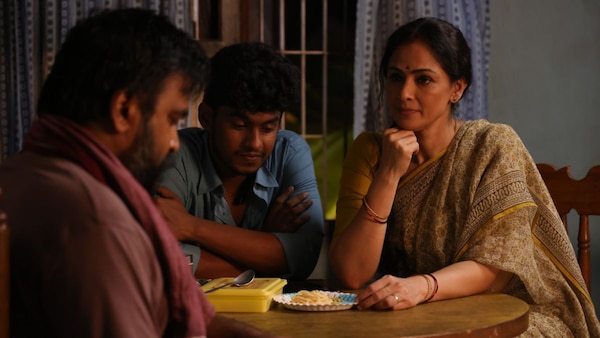
Still from Tourist Family.
When writing the child Mulli (a wonderful Kamalesh), did you struggle to rein in his precociousness?
Kind of. I thought of my aunt’s daughter while writing this character. She’s very young, very innocent, but speaks with so much smartness. Her counters won’t be those of a girl her age. I wanted Mulli to be lovable, not irritating. So, he had to be a little precocious and smart, but with his innocence intact. Take that scene in school, for instance, when the teacher asks him if he is from Sri Lanka. The child in him reacts first before the smart side takes over, and he says they are tourists. My challenge was to ensure that he doesn’t speak more than the meter I had set for him. And, I think we have achieved that.
In many ways, Tourist Family brought alive memories of Annanagar Mudhal Theru (1988), a remake of the Malayalam original Gandhinagar 2nd Street (1986). There, they lived together as one big family, warts and all, and here they learn to become a family. Where did you draw your inspiration for this setup?
Again, this is from my life in Tiruchi and Chennai, and how different the two were. Neighbours were almost family back home. Here, my next-door neighbour did not know me. I won’t blame people — life is faster in bigger cities. I’ve met most of the characters in the movie in real life. What you see when you are young makes a big impact on you.
Even when living amid so many people, sometimes, our basic need is just to be seen. That’s why the scene where Dharmadass asks the young man (played by Abishan himself) if he’s eaten. It is so important for that boy who is so down to have at least one person in such a big colony to tell him he ‘sees’ him.
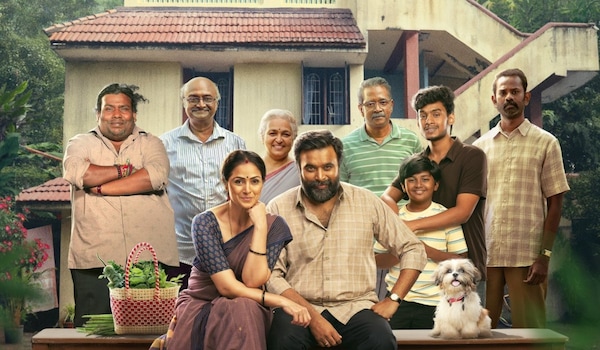
Promo poster for Tourist Family
Outwardly, your route to success seems easy — signing your first film at age 24, its release at age 25. But, honestly, how was it for an outsider who also happens to be young and not trained under a director to pitch?
I will acknowledge that my life and path in cinema were easier than others. But it was not a joyride. My age and lack of experience as an assistant director saw me face rejection at every step. But I kept hoping, and kept pitching. And then, finally, Million Dollar Studios happened. There’s a Bala anna there, and I kept pestering him to listen to my story. He liked it and said he would connect me to the people in charge. And, the film happened.
An interesting irony in your film is that while it celebrates hope and all things nice, it does not shy away from speaking of police excesses. What dictates your gaze in this aspect? Things you’ve seen, heard and read or lived experience?
I think I’ve absorbed all that happened around me, and what appears in the news. I realised the politics around language, in our case, Tamil. I did not want to force-fit them into the film, but I did so organically.
Let’s speak about your music soundscape… because composer Sean Roldan’s contribution lifts this film.
I don’t have a particular taste in music. I listen to a bit of everything, depending on my mood. I love Korean and English music. I fell in love with Sean Roldan’s music in Vaayai Moodi Pesavum. I felt they had great repeat value. The entire album Lover is a fond favourite. I wanted a slightly different soundscape for this movie. If you notice, even a song about death in the film does not have sad lyrics.
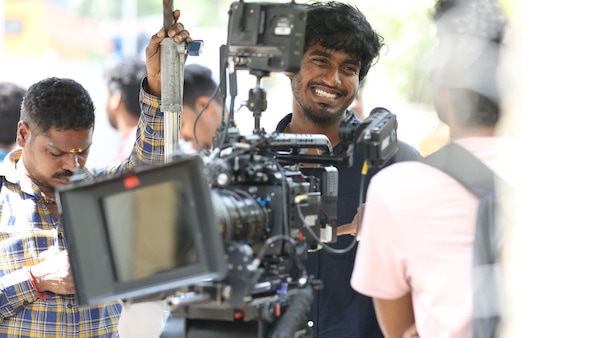
Abishan on the sets of Tourist Family.
In your very first film, you’ve worked with stalwart actors, and one of your leads is a director too. He’s been speaking about how the appreciation for his role is because you’d act out his character, and he just followed what you did.
That’s kind of Sasikumar Sir. But, my idea of direction is this — the complete performance is already in my mind, and I should give them a meter to follow. I think this habit of performing comes from my YouTube and short-film days. I was also a part of theatre (Abishan worked with Crea-Shakthi).
Abishan, with your very first film, you’ve got something others spend a lifetime chasing — the love of critics as well as success at the box office. You were very emotional after the press show. How are you feeling now, with full houses in the second week?
I was terrified when everyone said they loved the film. All that appreciation is scary. Then, the responsibility of this victory hit me. My next has to be as honest as this, it has to be something that leaves people thinking, without feeling they’ve been preached to. And, I’ve written just a one-line for my next. I have to get back to it.
I really don’t know it, yet. I am certain of three things I hope to stick to — I will not follow any trends when it comes to choosing a story. I will go with what story I want to narrate, and do it with honesty. Genre will not be a limiting factor.

